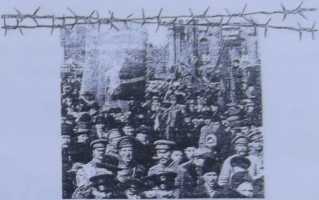DSCF6421
J M WINTER
oi the Orman war eHort »noe 1914. dui so The lengthening ęasuuity lifta added to the bttterness on the albed jucie of the linę and to their detcrmina* lian to see tłn* %»*j through to tolaJ Motors The krttscmrtch dug Its owo grave, and Intel attempts to dnrrt aftentłca* from thw faet gawr Great War propagand* « rrubtan sagnlfioance it dtd not ileserve Its fundamenta! eflfects were cultural not pabtłcal they pomted to an even darker futurę, and to the mobi-hzatton of hatred »n an evw> tnore terrible war
CHAPTER 17
Socialism, Peace, and Revolution, 1917-1918

JOHN HORNE
BI y 1914, war and peace, as well as revolution, had long exercised the imagination of soeialists. When, in November 1912, Europę seemed poised on the brink of war over the Balkans, the łeaders of the social-ist Second International met in Basie, Switzerland. As the great bells of the cathedral where they gathered tolled in waming, they issued a declaration that the likely price of war would be a revolutionary catastrophe for the rul-ing elites tliat unleashed it. Logically, perhaps, in an organization committed by its principles to socialist revolution, such a prediction should have been a matter of welcome, not waming. Sorne on the far left such as Lenin and Rosa Luxemburg, indeed saw war as a possible path to revolution. A new theoret-ical emphasis in pre-war socialist thought on the latest stage of capitahsm as one of eeonomic imperialism, in which conflict between international eco-nomic forces would lead to continuous wars and eventual revolution, tended in the same direction. Lenin was to provide the most famous formulation of this idea in Imperialism, the Highest Stage of Capitalism, written in 1916.
But, by and large, European soeialists were remarkable for their resolute hostility to the idea of war and for the detachment of the question ofwar and peace from tliat of revolution. Developments sińce die. founding of the International in 1889 had underlined the importance of the national circuni-
227
Wyszukiwarka
Podobne podstrony:
Anex nr 1 to WSSM Regulations: Hereby I order the paragraph concerning the ECTS to be added to WSSM
DSCF6416 J. M. WINTER the spread of democratic ideas. Altemative justifications of the war effort ha
DSCF6417 J. M.WINTER Above, left Morale in all armies depended on the maintenance of stron
DSCF6420 J. M. WINTER half tliat of the British cinema industiy but with Danish and American imports
Download Geometria del piano PDF eBooks Free months, Winter won the Championship at Hardcore Justice
k5 cremation pits PhotoSkeich map showing the posilion oi the Soiulcrkomm Krematorium V in August 19
WINTER IN THE FOREST MBOL DMC COLOR white white white and Balger® Pearl
TCLePHONf NO 29M9 Cr ..7 Lth December, 19^-5- Miss Barnard and one member of the staif oi the Norwic
35 less than one degree in the next two months. Overall, the second winter of the study was colder t
opis strona 7 ■ poinls SW2 and Connect both oi the push butlon wires lo Ihe wiros lo poinls SW1. If
pOpcornflix M0V1ESTV.FR£Ł r oi F * The Wild Thornberrys Movie 1h 26m PG In the
Mr. B retires but the bandplays on The Marching Bulldogs added rhythm to the halltime excitemen
Stroni wrlicals tn this shol taken by John Rutkowski #eems to underhne the ■nernuriatton oi the Sent
więcej podobnych podstron